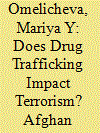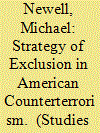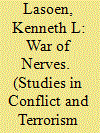|
|
|
Sort Order |
|
|
|
Items / Page
|
|
|
|
|
|
|
| Srl | Item |
| 1 |
ID:
168390


|
|
|
|
|
| Summary/Abstract |
In the United States, despite federal efforts to empower communities to form local governance networks to develop and implement collaborative countering violent extremism (CVE) programs, local CVE governance networks are rare. Why do CVE governance networks emerge within only some communities? I argue that three factors—interest in CVE, capacity to participate, and facilitation—determine the prospects for the emergence of a CVE governance network within a community. The article uses a matching technique to identify and compare the community stakeholder responses to CVE in two communities—Houston, TX and Columbus, OH. Survey research of stakeholders who participated in Houston and stakeholders most likely to participate in Columbus but did not highlights the importance of the three factors. By focusing on these drivers of collaborative governance, the article provides an explanation for the lack of CVE collaboration in the United States.
|
|
|
|
|
|
|
|
|
|
|
|
|
|
|
|
| 2 |
ID:
168389


|
|
|
|
|
| Summary/Abstract |
The relationship between drug trafficking and terrorism remains a contentious issue. While some assert that drug trafficking is a strong predictor of terrorism, others contest this observation. This study focuses on the impact of the Afghan opioid trade on terrorist violence in Central Asia, a region of drug transit states. We employ Geographic Information Systems–enabled visualizations of the drug trade and terrorism as well as statistical tests to study the drug–terror relationship at the subnational level. Our findings lend support to the argument that the drug trade facilitates terrorism, but we also find that the drug–terror relationship is multifaceted, complex, and intimately linked to the state.
|
|
|
|
|
|
|
|
|
|
|
|
|
|
|
|
| 3 |
ID:
168387


|
|
|
|
|
| Summary/Abstract |
Through its prolific propaganda, the self-declared Islamic State (IS) seeks to attract new recruits, motivate existing members, and assert the group's legitimacy. This study addresses the question of how IS attempts to legitimize itself through its official rhetoric by exploring its invocation of religious authority via reference to sacred Islamic texts. The study focuses on a specific category of religious scripture: the collected words and actions of the Prophet Muhammad, known as the hadith. The body of hadith has historically served as a bridge of authority from past to present, linking later individuals and groups to the legacy of the Prophet. Related studies have demonstrated that within the Arabic-speaking community in general, citing hadith and Qur'an is an everyday rhetorical strategy for argumentation across all topics, secular and sacred. This article takes an in-depth look at the hadith quotations included in a sample of official IS propaganda to compare the relative frequency of specific themes and to determine which hadith compilations IS publicists prefer. The study compares the quotation of hadith across media platforms (videos, newsletters, and magazines), genres (print and video), and languages (Arabic and English). The findings show that IS messaging tends to quote hadith from canonical Sunni collections. The study highlights important differences between English and Arabic language propaganda, noting in particular that English-language propaganda focuses more on apocalyptic prophecies than Arabic-language materials. Case studies illustrate how IS selectively draws on the vast body of hadith literature as part of the group's strategic framing.
|
|
|
|
|
|
|
|
|
|
|
|
|
|
|
|
| 4 |
ID:
168382


|
|
|
|
|
| Summary/Abstract |
Empirical studies analyzing the push factors of expat jihadism are scarce and typically give contradictory results. We hypothesize that youth unemployment, as opposed to overall unemployment, is a significant determinant of foreign fighters flow to join the Islamic State. Moreover, we also consider the interaction between youth unemployment and the Muslim population share as another meaningful variables affecting expat jihadism. Controlling for several variables including gross domestic product per capita; Gini; geographical proximity; the share of manufactures and services as a percentage of Gross Domestic Product; Polity score; and fractionalization, we provide strong evidence for the hypothesis that Muslim youth unemployment is a driver of expat jihadism not only for Muslim-majority countries, but globally.
|
|
|
|
|
|
|
|
|
|
|
|
|
|
|
|
| 5 |
ID:
168384


|
|
|
|
|
| Summary/Abstract |
This article explores the extent to which the secret talks influenced the path of official negotiations toward ending Turkey's Kurdish conflict, which the scholarly literature has yet to assess. Utilizing interviews with key political actors, this article aims to close this gap by assessing the Oslo talks (2006–2011) as the most comprehensive secret contact between the Turkish government and Kurdistan Workers' Party. It demonstrates that the secret track is not merely a “pre-negotiation” stage aimed at de-escalating the violent conflict ahead of official talks, but also a crucial part of the negotiation stage aimed at establishing a final political agreement.
|
|
|
|
|
|
|
|
|
|
|
|
|
|
|
|
| 6 |
ID:
168381


|
|
|
|
|
| Summary/Abstract |
Despite the traditional restrictive views of Islamic jurisprudence on women's social activities, the level of women's incorporation into jihadi organizations is growing rapidly in both numbers and roles. This article argues that this increase reflects a strategic logic—jihadi groups integrate women to enhance organizational success. The article develops a typology of jihadi organizations: operation-based and state building and argues that the strategic logic of women in operation-based organizations lays in the tactical advantages women provide them. However, for state-building jihadi groups, the strategic logic of women is geared toward addressing the challenges facing a functioning state.
|
|
|
|
|
|
|
|
|
|
|
|
|
|
|
|
| 7 |
ID:
168391


|
|
|
|
|
| Summary/Abstract |
While garnering heightened attention following the Trump administration's travel restrictions, exclusionary tactics in counterterrorism have a much lengthier history. Given that some terrorism studies scholars identify social and political exclusion as an explanation for the resort to terrorist violence, the selection of a strategy of exclusion is significant. In this article, I identify the elements of a strategy of exclusion and the logic behind this strategy. In particular, I examine the origins and persistence of this strategy in the U.S. context. Rather than a contemporary anomaly, exclusion was among the first strategies the United States added to its counterterrorist tool-kit, and has remained among the most consistent strategies relied on. I trace the history of this strategy from its origins in immigration restrictions passed following the assassination of President McKinley by an anarchist through the contemporary War on Terror. Controversy surrounding this strategy, its negative effects on nonviolent immigrant populations, and its failure to prevent further acts of terrorism suggest it was historically ineffective and may also be so today.
|
|
|
|
|
|
|
|
|
|
|
|
|
|
|
|
| 8 |
ID:
168385


|
|
|
|
|
| Summary/Abstract |
Criminal gangs, while posing the most substantial threat to security in the Western hemisphere, fall outside the scope of contemporary studies in the field of mediation and negotiation. The prevailing wisdom that gangs are unmanageable due to their apolitical nature and the high political cost of dialogue has led to an approach that relies heavily on the security sector. While the security sector can and must play a role, confrontation alone has proven insufficient. The three-step theory presented in this article seeks to explain how and when to engage in dialogue as an alternative means of confronting criminal gangs. The success of this process, a reduction in violence and criminality through the transformation of gang-related conflict, hinges on sequencing and begins with state-sponsored mediation conducted in secret to establish a cease-fire between the gangs, then enters the phase of public negotiation between the state and the gangs, and finally concludes with a process of mainstreaming the reformed structures into society. This theory assumes that mediators can work with the gangs through a process of assisted articulation to develop a negotiating position, opening a zone of possible agreement between the government and the gangs. El Salvador offers a compelling example of how a society steeped in gang violence might pursue dialogue while also highlighting the threats posed to any negotiation.
|
|
|
|
|
|
|
|
|
|
|
|
|
|
|
|
| 9 |
ID:
168383


|
|
|
|
|
| Summary/Abstract |
The large number of names on terrorism watch lists raises the problem of monitoring. Given the existing resource constraints and other logistical considerations, efficient and accurate ranking of individuals in terms of threat posed is of paramount importance. This process, however, may be impacted by reference points, diminishing sensitivity, loss aversion, and other aspects of the human decision-making process that introduce biases. This article explores the relevance of decision-making processes and biases to the specific task of ranking and monitoring individuals whose names have been placed on a terrorism watch list.
|
|
|
|
|
|
|
|
|
|
|
|
|
|
|
|
| 10 |
ID:
168388


|
|
|
|
|
| Summary/Abstract |
Terrorist group rivalries and alliances have important consequences, but the sources of these relationships are debated. This article offers a side-by-side examination of correlates of terrorist rivalries and alliances. Global analyses of hundreds of terrorist groups find violent rivalry is associated with drug trafficking, state sponsorship, ethnic motivation, and operating in a civil conflict country. Alliances are associated with territorial control, intermediate membership size, and religious motivation. The idea that alliances are an indicator of weakness does not find much support. When relationships are disaggregated into theoretically relevant categories (inter-field and intra-field rivalries, and domestic and international alliances), further distinctions appear.
|
|
|
|
|
|
|
|
|
|
|
|
|
|
|
|
| 11 |
ID:
168386


|
|
|
|
|
| Summary/Abstract |
The terror threat emanating from Daesh-inspired violent radicalization has made the vulnerability of soft targets and the means to defend them a pressing security challenge. Belgium responded to the threat by deploying the army to help protect the public space against terrorist attacks. This article explores the Belgian case of a counterterrorism mission by the military on home soil, but also looks at the wider security challenges posed by an asymmetric threat to the most vulnerable aspects of daily life, exploiting the openness and mobility of society. The study will also examine alternative ways to employ the necessary military skills and expertise to counter the threat to soft targets, from a re-examination of deterrence theory and by the utility of force, and introducing the concept of “marketing for counterterrorism” as a corollary to cognitive defense. It concludes with what tactical opportunities and policy prescriptions are presented for homeland security.
|
|
|
|
|
|
|
|
|
|
|
|
|
|
|
|
|
|
|
|
|